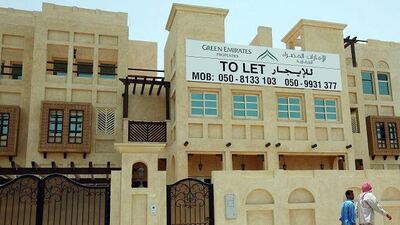ABU DHABI // A new property law in the capital will make it easier for landords to evict low-paying tenants, in effect weakening the existing rent cap. And for the first time, judges will settle rent disputes under the umbrella of the Ministry of Justice.
The new legislation will be fully implemented by November. The five per cent rent cap will remain, but landlords will now be able to evict tenants at the end of the lease period, after giving two months' notice for residential property and three months for commercial property, and take on new tenants at a renegotiated rent. The new law removes the automatic right of tenants to renew leases for five years with a maximum five per cent rent increase each year.
Property analysts were divided yesterday on the effect on rents of the new law; some said it would benefit landlords and property investors by effectively establishing a "floor" for rents, but others said downward pressure on rents in Abu Dhabi would continue as more units came on to the market and Dubai rents remained more competitive. Rents more than doubled in the capital between 2006 and 2008, and barely decreased during the economic downturn because of a lack of accommodation on the market.
Many landlords were unable to remove tenants or, because of the mandatory five per cent cap, raise rent in line with the market. David Nunn of the law firm Simmons and Simmons said: "The rent cap is not being touched but the automatic right of renewal of the leases is being removed. Before, you knew you could call unilaterally for an extension after the term of the lease, for up to five years, even if the landlord wanted you to leave.
"Some landlords actually preferred to keep a building empty in the hope of reselling it, rather than be stuck with a tenant for years." The new law will also bring the existing Abu Dhabi Rental Disputes Resolution Committee and its appeal arm under the authority of the Ministry of Justice, and add a third level, the cassation committee. Karim Nassir, a partner from the law firm Habib al Mulla, said: "The chairman of the rent, appeal and cassation committees should be a judge, whereas they used to be appointed by the Executive Council.
"The employees now are part of the Department of Justice. This is the place where it should be. Now the committees are chaired by a judge so we have a legal professional on the committee." Tenants, however, were more concerned about the effect on rents. Graham Bentley, 34, from Dunstable in the UK, who rents a villa with his family in the Officer's City district of Abu Dhabi, said: "It sounds like a nightmare. Tenants are going to have a lot less protection."
Mr Bentley admitted the existing law was too harsh on property owners, but said the tide had now shifted too much. "If the market pushes rents up the way it has done in the past but rents are capped at five per cent, then landlords will just throw out the existing tenants at the end of their contract and get someone in for more money," he said. "Most people in Abu Dhabi already think they are paying over the odds for where they are living. Lots of people are already moving to Dubai because of high rents."
Tenants who are about to reach the end of their lease will be able to stay until November this year if they have not lived there for five years, according to the law. Landlords will not be able to ask them to leave. "Many tenancy contracts have been signed under law 20 of 2006, which would expire today," Mr Nassir said. "Everything has been postponed to November 2010." A landlord could still evict a tenant before then, however, provided the Rental Disputes Resolution Committee agreed on the basis that the occupancy "causes serious harm to the landlord", the law says, and provided the tenant had already been living there for two years.
Ziad Bushnaq, from the brokerage Cornerstone said: "Abu Dhabi landlords should rather think about decreasing rents as they will face more competition very soon." Mark Orman, a property lawyer with Trowers and Hamlins, said the change would make it easier for landlords to redevelop rundown buildings. "A lot of the properties here are quite old and in a bad state of repair," he said. "For landlords who wish to redevelop them, it can be quite a complicated process. This change will make it much easier to improve the quality of apartments in Abu Dhabi."
@Email:ngillet@thenational.ae chamilton@thenational.ae

